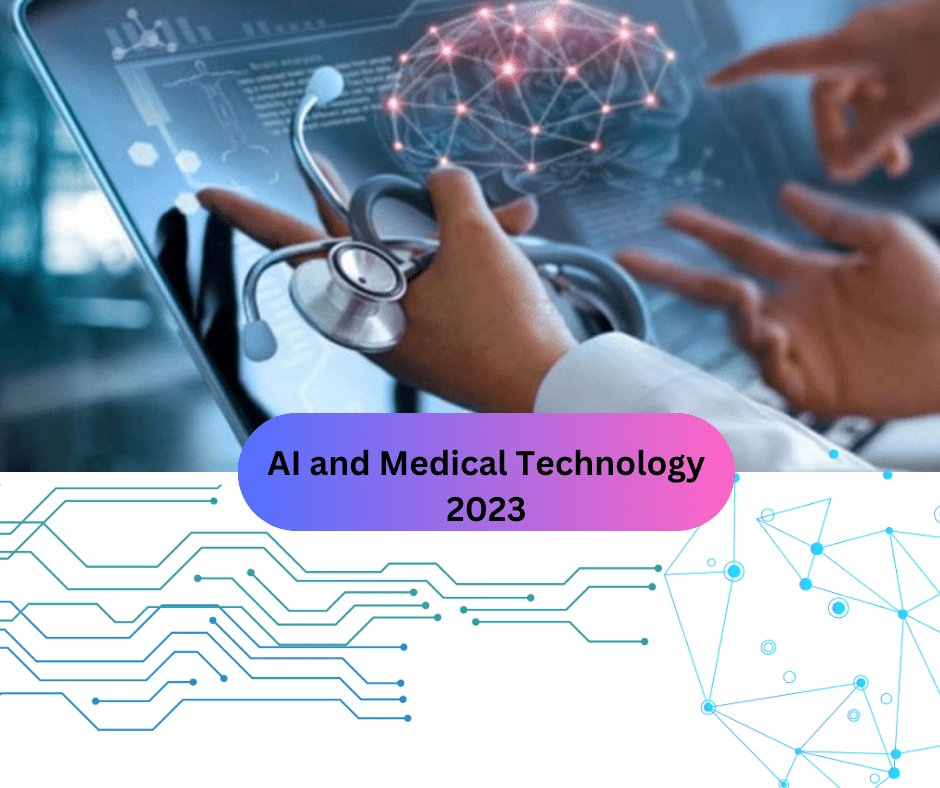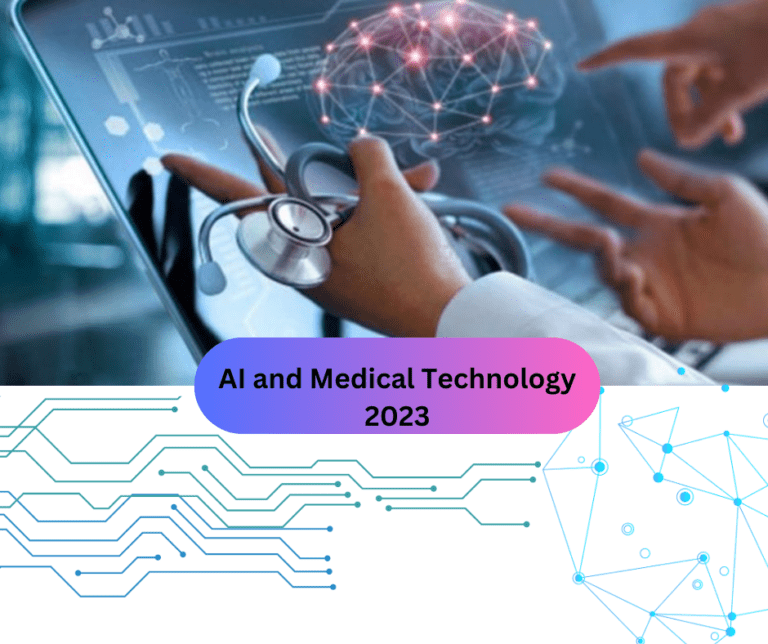Explore the transformative impact of AI in healthcare and medical technology. Discover how these innovations are shaping the future of medicine.

Introduction
The healthcare industry is on the cusp of a transformative revolution, driven by the integration of artificial intelligence (AI) and advanced medical technology. As we enter the year 2023 and look ahead to 2024, this article explores the profound impact of AI and medical technology on healthcare, showcasing the innovative developments and potential benefits that are reshaping the landscape of medicine and patient care.
Diagnosis and Early Detection – Medical Technology
Advances in AI technology are revolutionizing the field of medical diagnosis. Machine learning algorithms are now capable of analyzing vast datasets of medical images, such as MRIs and CT scans, with unparalleled precision. This has led to a significant improvement in early disease detection rates, especially for conditions like cancer, diabetes, and cardiovascular diseases. In 2023 and beyond, these technologies are expected to further refine their capabilities, saving lives and reducing healthcare costs through early intervention.
Personalized Medicine
Personalized medicine, once a concept of the future, is now becoming a reality, thanks to AI. By analyzing an individual’s genetic makeup, medical history, and lifestyle data, AI algorithms can create treatment plans tailored to each patient’s unique needs. This approach not only enhances treatment efficacy but also minimizes side effects. In the years ahead, we can anticipate an upsurge in therapies and medications customized to a patient’s genetic profile, offering new hope for those with complex medical conditions.
Telemedicine and Remote Monitoring
The advent of AI-powered telehealth platforms has transformed the way patients access medical care. The year 2023 is expected to see a continued expansion of telemedicine, providing patients with convenient and efficient ways to consult with healthcare professionals. Additionally, remote monitoring devices equipped with AI algorithms will enable physicians to track patients’ vital signs and health trends in real-time. This not only enhances patient care but also reduces hospital readmissions, ultimately improving healthcare outcomes.
Drug Discovery and Development
AI is playing a pivotal role in accelerating drug discovery and development processes. By predicting potential drug candidates and their effects on specific diseases, AI-driven simulations and predictive modeling are shortening the time and cost required to bring new medications to market. As a result, we can anticipate a surge in groundbreaking treatments and therapies for conditions that were once considered untreatable, offering new hope to patients worldwide.
Healthcare Operations and Efficiency
AI is not confined to clinical applications but extends to healthcare operations as well. Hospitals and healthcare systems are increasingly adopting AI-powered solutions to streamline administrative tasks, optimize resource allocation, and improve patient flow. These innovations will reduce operational costs and enhance the overall patient experience, making healthcare more accessible and efficient.
Ethical Considerations and Data Security
While AI holds immense promise, ethical considerations and data security are paramount. In 2023 and 2024, policymakers and healthcare institutions will need to establish robust guidelines and security measures to protect patient data and ensure the responsible use of AI in medicine. Striking the right balance between innovation and ethics will be a crucial challenge as we navigate this AI-driven healthcare landscape.
Conclusion
The convergence of AI and medical technology in 2023 and 2024 is ushering in a new era of healthcare. From early disease detection to personalized medicine, telemedicine to drug discovery, these advancements are poised to improve patient outcomes, reduce healthcare costs, and enhance healthcare delivery. However, it is imperative to address ethical concerns and data security to ensure that these innovations benefit society while upholding the highest standards of patient care and privacy.
FAQs
- What is the role of AI in early disease detection? AI plays a crucial role in early disease detection by analyzing medical images and identifying anomalies with remarkable precision, especially in conditions like cancer and cardiovascular diseases.
- How does personalized medicine benefit patients? Personalized medicine tailors treatment plans to an individual’s unique genetic makeup, improving treatment efficacy while minimizing side effects.
- What are the advantages of telemedicine in 2023? In 2023, telemedicine offers patients convenient access to healthcare professionals, reducing the need for physical visits and improving healthcare accessibility.
- How is AI accelerating drug discovery? AI predicts potential drug candidates and their effects on diseases, speeding up the drug discovery process and leading to breakthrough treatments.
- What are the key considerations for AI in healthcare ethics? Ethical considerations in healthcare AI include data privacy, responsible AI use, and ensuring that patient data is protected and used ethically.
- What is AI’s role in healthcare?
- AI is playing a pivotal role in healthcare by automating tasks, analyzing medical data, and assisting in diagnostics.
- How does AI improve medical diagnostics?
- AI algorithms can analyze vast amounts of medical data quickly, aiding in early disease detection and more accurate diagnoses.
- Are there any AI-powered medical devices?
- Yes, there are AI-driven medical devices, such as smart prosthetics, wearable health monitors, and robotic surgery systems.
- Can AI predict patient outcomes?
- AI can analyze patient data to predict outcomes, helping doctors make informed decisions for better patient care.
- What about AI in drug discovery?
- AI accelerates drug discovery by analyzing genetic data, identifying potential drug candidates, and predicting their effectiveness.
- Is data privacy a concern with AI in healthcare?
- Yes, data privacy is a concern. Healthcare institutions must ensure strict security measures to protect patient data.
- How does AI benefit patients?
- Patients benefit from AI through improved diagnoses, personalized treatment plans, and quicker access to medical information.
- Are there any ethical considerations with AI in healthcare?
- Ethical considerations include bias in algorithms, patient consent, and ensuring AI complements human expertise.
- What’s the future of AI in healthcare?
- The future holds more AI-driven innovations, telemedicine advancements, and improved healthcare accessibility.
- How can healthcare professionals embrace AI?
- Healthcare professionals can embrace AI through training, staying updated with AI applications, and collaborating with technology experts.
